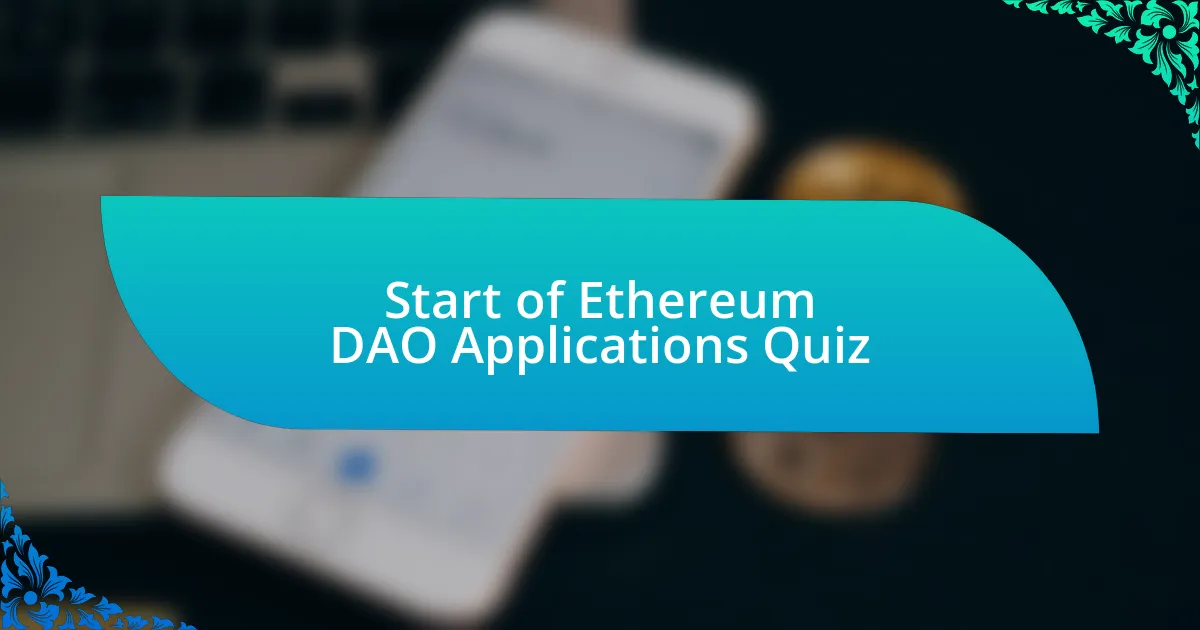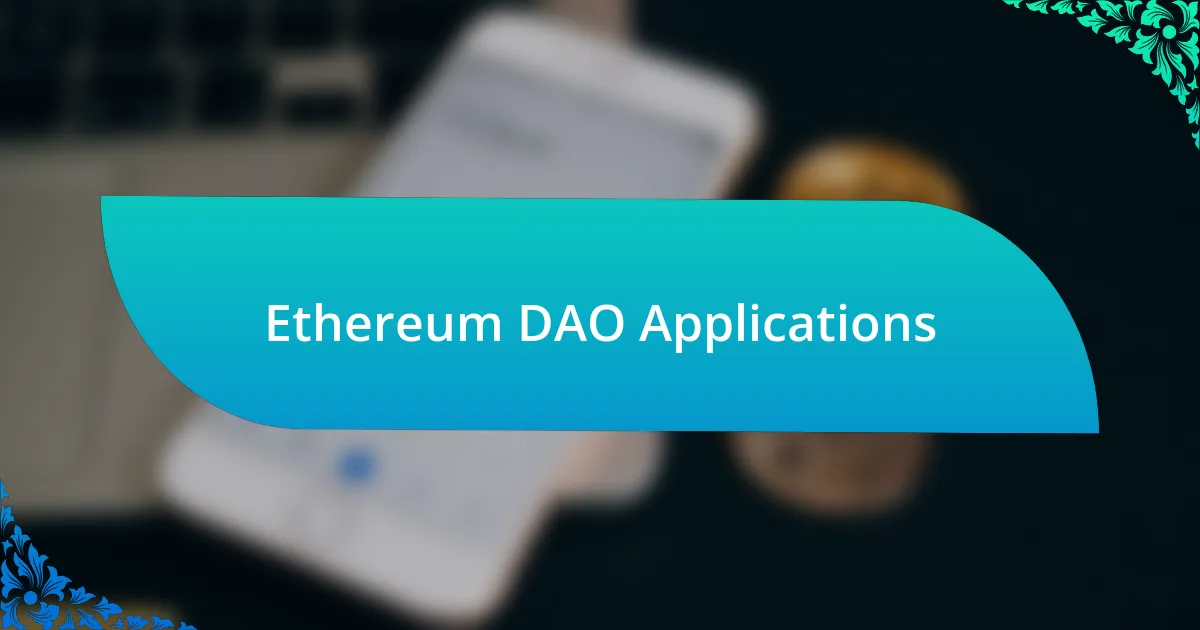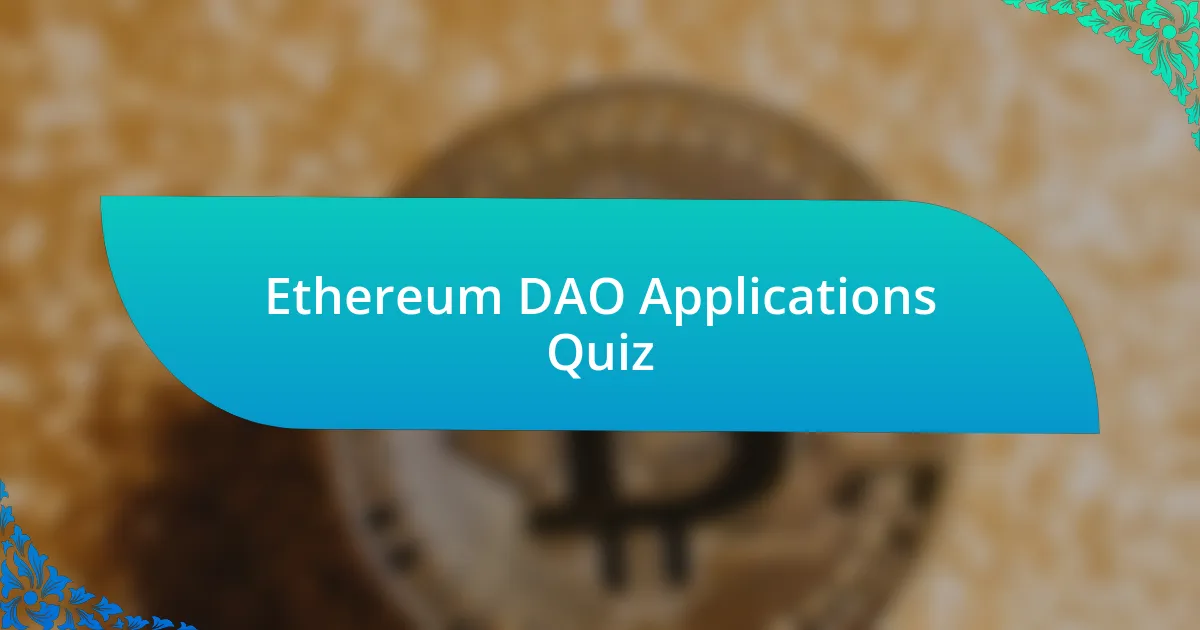
Start of Ethereum DAO Applications Quiz
1. What does DAO stand for in the context of Ethereum applications?
- Digital Asset Operator
- Decentralized Autonomous Organization
- Distributed Algorithmic Outcome
- Dynamic Application Operator
2. Can DAOs operate without central authority?
- Yes, DAOs can operate without central authority.
- No, DAOs function only under government oversight.
- Yes, but only with strict regulations.
- No, DAOs require a central authority.
3. What drives the decision-making process in a DAO?
- Private agreements
- Centralized leadership
- Random chance
- Governance tokens
4. What technology underpins the governance of DAOs?
- Virtual reality
- Artificial intelligence
- Cloud computing
- Smart contracts
5. What role do smart contracts play in DAO operations?
- Smart contracts manually manage community discussions and decisions within DAOs.
- Smart contracts create physical contracts that must be signed by members before decisions are made in a DAO.
- Smart contracts automate processes and ensure transparency in DAOs by encoding the rules that govern the organization.
- Smart contracts serve solely as a tool for fundraising activities, without affecting governance in a DAO.
6. Why are governance tokens essential for DAO participants?
- Governance tokens allow holders to trade assets for profit.
- Governance tokens empower users to create unlimited financial resources.
- Governance tokens give holders voting rights within the DAO.
- Governance tokens enable members to enforce legal contracts outside the DAO.
7. How do DAOs contribute to financial democratization?
- DAOs allow decentralized decision-making, enabling financial control for all members.
- DAOs exclude individuals without financial knowledge from participation.
- DAOs focus on centralizing power among a few key individuals.
- DAOs primarily serve to benefit only wealthy stakeholders.
8. What distinguishes a DAO from traditional organizations?
- DAOs are controlled by their community members through smart contracts.
- DAOs are strictly regulated by government authorities.
- DAOs operate only within a specific geographical area.
- DAOs are managed by a single leader who makes all decisions.
9. What voting systems are commonly implemented in DAOs?
- Ranked choice voting
- Liquid voting
- Plurality voting
- First-past-the-post voting
10. How does the Maker DAO stabilize its stablecoin, DAI?
- By relying on central banks to issue more coins.
- By using collateralized debt positions to manage risk.
- By pegging the coin to gold reserves.
- By creating unlimited tokens to match demand.
11. What platform does Curve DAO support for stablecoin trading?
- Solana
- Binance Smart Chain
- Ethereum
- Polkadot
12. Which decentralized exchange is known for its extensive treasury?
- SushiSwap
- PancakeSwap
- 1inch
- Uniswap
13. How does Gnosis DAO innovate within prediction markets?
- Gnosis DAO creates decentralized prediction markets using Ethereum smart contracts.
- Gnosis DAO limits prediction markets to approved participants only.
- Gnosis DAO focuses solely on token trading without any forecasting features.
- Gnosis DAO employs centralized prediction algorithms for accuracy and efficiency.
14. What does Aragon DAO provide for aspiring DAO creators?
- Legal consultancy and market analysis
- Advertising and promotional support
- Centralized management and resource allocation
- Governance, accounting, fundraising, and voting tools
15. In what ways can DAOs promote community engagement?
- DAOs can eliminate all forms of communication.
- DAOs can restrict membership to only a few individuals.
- DAOs can organize traditional in-person meetings.
- DAOs can create voting opportunities for community inputs.
16. What features allow Flamingo DAO to manage decentralized organizations?
- High transaction fees
- Centralized control
- Effective voting mechanisms
- Limited transparency
17. How do DAOs preserve transparency in decision-making?
- DAOs depend on a central authority to oversee and enforce decisions.
- DAOs use smart contracts that encode rules and make decision-making processes publicly visible.
- DAOs maintain privacy by keeping all transaction details hidden from the public.
- DAOs rely solely on informal discussions among members to reach decisions.
18. What risk management strategies are common in DAOs?
- Using smart contracts for automation and transparency
- Ignoring member participation entirely
- Centralized decision-making processes
- Relying on traditional financial institutions
19. How does token ownership influence DAO governance?
- Token holders lose their voting rights during governance.
- Token ownership has no impact on decision-making processes.
- Token holders gain voting rights, influencing decisions in the DAO.
- Only developers can govern the DAO regardless of token ownership.
20. What importance does community consensus have in resolving disputes?
- Disputes are resolved by a single leader without community input.
- Community members ignore disputes and focus on their own goals.
- The community does not participate in the decision-making process.
- The community votes collectively to address issues fairly.
21. How are conflicts typically managed within a DAO framework?
- By appointing a central authority to make decisions.
- By disregarding community input in favor of technical performance.
- Through voting mechanisms and governance tokens.
- Using a secret ballot system controlled by the developers.
22. What advantages do DAOs offer over centralized financial systems?
- High fees for transactions and withdrawals
- Exclusive membership for financial benefits
- Centralized decision-making and control
- Decentralized governance and transparency
23. How do DAOs navigate regulatory challenges while operating?
- DAOs work with legal advisors to navigate regulations.
- DAOs ignore regulations and operate freely.
- DAOs rely solely on community opinions for compliance.
- DAOs use centralized authorities to guide regulatory actions.
24. What is the process for liquidating collateral in Maker DAO?
- The process involves freezing assets indefinitely until market conditions improve.
- The process requires selling collateral at a fixed price directly to users.
- The process involves liquidating undercollateralized positions using auctions.
- The process is managed by a centralized authority that handles all transactions.
25. How do DAOs utilize liquidity pools in financial applications?
- DAOs use liquidity pools to create centralized exchanges for faster transactions.
- DAOs use liquidity pools to store cryptocurrencies for longer-term investments.
- DAOs use liquidity pools to secure loans for individual members.
- DAOs use liquidity pools to facilitate trading by providing a source of funds and reducing price volatility.
26. How is community involvement vital in the governance of DAOs?
- The community relies entirely on external authorities for decision-making processes.
- The community ensures that member interests shape governance and decisions in the DAO.
- The community plays a passive role without influencing any of the DAO`s actions.
- The community is only involved in fundraising and not governance activities.
27. What significance does the treasury hold in the operation of a DAO?
- The treasury in a DAO manages the financial resources of the organization, often using funds raised through token sales.
- The treasury in a DAO controls the coding of smart contracts for governance.
- The treasury in a DAO exclusively handles community voting on all decisions.
- The treasury in a DAO is responsible for marketing and public relations efforts.
28. How can DAOs help enhance the security of financial transactions?
- DAOs help enhance security by storing all funds in physical banks.
- DAOs operate without any form of digital infrastructure or technology.
- DAOs only rely on a central authority to oversee financial transactions.
- DAOs use smart contracts to provide transparency and automate trust in transactions.
29. Why is testing critical in DAO-related smart contracts?
- To eliminate the need for community governance.
- To increase the speed of transactions.
- To reduce gas fees associated with contracts.
- To prevent errors and security vulnerabilities.
30. What mechanisms do DAOs deploy to manage gas costs?
- Setting up mechanisms to manage gas usage efficiently
- Disabling smart contracts to avoid gas costs
- Using centralized servers to pay gas costs
- Ignoring gas fees completely during transactions

Quiz Completed Successfully!
Congratulations on completing the quiz on Ethereum DAO Applications! We hope you found the experience enjoyable and insightful. Engaging with the questions helped reinforce your understanding of decentralized autonomous organizations, and you may have picked up key concepts that highlight their potential within the Ethereum ecosystem. Each answer you provided reflects your growing knowledge about how DAOs operate and their real-world applications.
Throughout the quiz, you likely explored how DAOs can revolutionize governance, enhance transparency, and enable collective decision-making. You may now have a clearer picture of various DAO structures, their advantages, and challenges. This foundational knowledge is vital as the significance of DAOs continues to rise in the blockchain space.
We encourage you to dive deeper into this fascinating topic. Check the next section on this page for comprehensive resources about Ethereum DAO Applications. There, you will find detailed explanations and case studies that will further expand your understanding. Happy learning!

Ethereum DAO Applications
Understanding Ethereum DAO Applications
Ethereum DAO applications refer to decentralized autonomous organizations built on the Ethereum blockchain. They operate through smart contracts, enabling self-governance without intermediaries. Each DAO has its own rules encoded in smart contracts, allowing members to vote on proposals and manage fund allocation. This structure fosters transparency and democratic decision-making within the organization.
Key Features of Ethereum DAO Applications
Key features of Ethereum DAO applications include decentralization, transparency, and community governance. Decentralization eliminates a central authority, distributing power among members. Transparency ensures all transactions and decisions are recorded on the blockchain, allowing anyone to verify actions. Community governance is facilitated through voting mechanisms, where stakeholders can directly influence the direction of the organization.
Use Cases of Ethereum DAO Applications
Ethereum DAO applications are utilized in various areas, such as venture capital, token management, and charitable organizations. In venture capital, DAOs pool resources to fund startups, allowing members to vote on investment decisions. Token management DAOs govern the distribution and usage of tokens, ensuring equitable access. Charitable organizations use DAOs to facilitate donations and distribute funds efficiently, maintaining accountability.
Popular Ethereum DAO Examples
Several prominent Ethereum DAOs showcase the functionality of this structure. MakerDAO manages the DAI stablecoin, allowing users to collateralize assets for decentralized loans. Aragon provides tools for creating and managing DAOs, promoting user-friendly governance. Compound is another example, allowing users to lend and borrow assets while collectively managing protocol policies through community proposals.
Challenges Facing Ethereum DAO Applications
Challenges facing Ethereum DAO applications include security vulnerabilities, legal uncertainties, and governance issues. Smart contracts can be exploited if not properly audited, risking funds and trust. Additionally, legal frameworks around DAOs are still evolving, creating uncertainties for compliance. Governance can become contentious, as differing opinions among members may lead to stalemates or conflicts over decision-making.
What are Ethereum DAO Applications?
Ethereum DAO applications are decentralized autonomous organizations built on the Ethereum blockchain. These applications utilize smart contracts to facilitate governance and decision-making processes without central authority. Notably, platforms like MakerDAO and Aragon exemplify how these organizations operate through member voting and transparent management of funds.
How do Ethereum DAO Applications function?
Ethereum DAO applications function through smart contracts that automatically execute actions based on predefined rules. Members typically hold governance tokens, allowing them to propose and vote on changes. This decentralized structure enhances transparency and user participation, as decisions benefit from the collective input of stakeholders.
Where can Ethereum DAO Applications be found?
Ethereum DAO applications can be found on the Ethereum blockchain and various decentralized finance (DeFi) platforms. Examples include DEX platforms like SushiSwap and governance frameworks like Compound. They are typically accessible through web interfaces that interact with Ethereum’s network.
When did Ethereum DAO Applications emerge?
Ethereum DAO applications began to emerge around 2016 with the launch of The DAO, which aimed to create a venture capital fund managed by its members. This initial attempt was followed by numerous projects and refinements in governance models, significantly expanding the landscape of DAO applications on Ethereum.
Who uses Ethereum DAO Applications?
Ethereum DAO applications are used by individuals and teams interested in decentralized governance and investment strategies. Users include cryptocurrency investors, developers, and communities focused on collaborative decision-making. These applications cater to various interests, from funding projects to managing digital assets.

